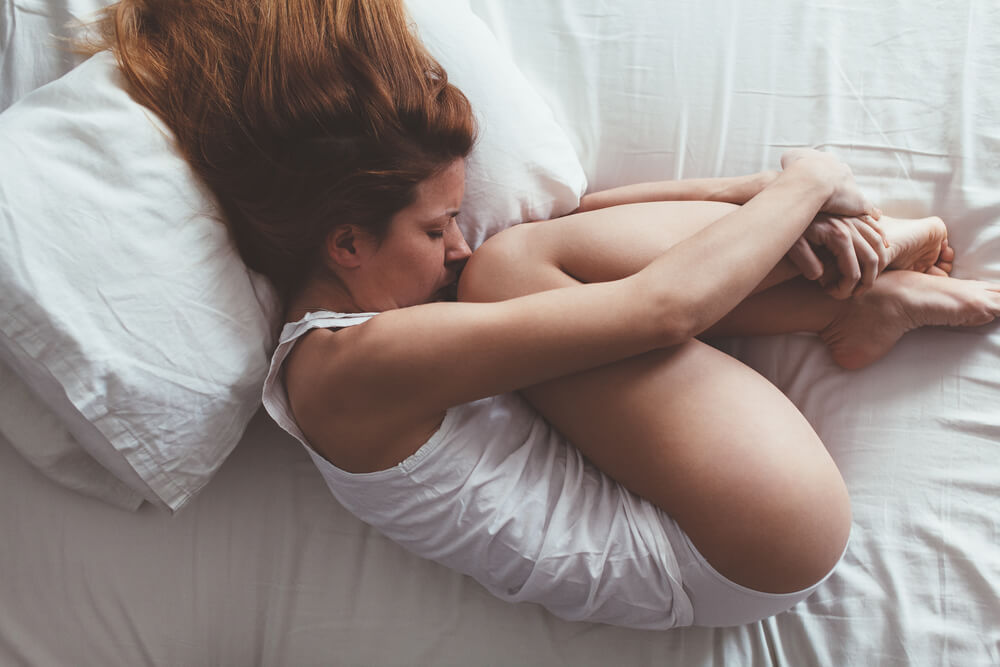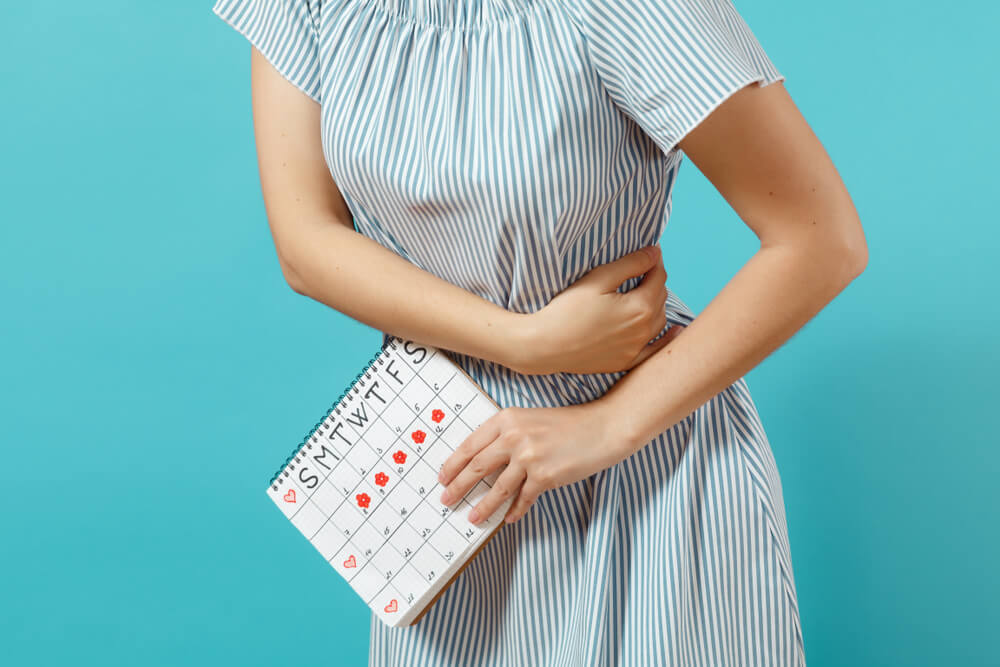Each month during menstruation, many women suffer from dysmenorrhea or painful periods. For many, this period pain can look like general discomfort, soreness, and headaches, but for others, dysmenorrhea is caused by period cramps. These cramps can cause back pain during periods and pain in the stomach, groin, or upper thighs. New Age Women’s Health is here to help you address period pain and share tips on how you can curb them.
Why Period Cramps Happen
As we now know, it is, in fact, common to experience discomfort in your abdomen, thighs, groin, and lower back during menstruation. During menstruation, pain with periods and cramping often occurs because the uterus contracts and relaxes, or squeezes, to shed the lining it has built up. Period cramps are common because your muscles are at work! More bothersome symptoms such as nausea, headaches, diarrhea, and vomiting may also occur during menstruation. While it is not always medically decipherable why women have more period pain than others, there are some factors that can contribute, including:
- Just starting your period
- Being under 20 years of age
- Having a heavy blood flow
- Having your first child
- A sensitivity or overproduction to prostaglandins
Thankfully, for mild or temporary cramps, many at-home remedies can provide relief for your pain. However, there are some other factors that cause period pain to look out for, including polycystic ovary syndrome, endometriosis, and more. Let’s look at some menstrual disorders that can be responsible for pain.

What Causes Painful Periods
It makes sense why many women would ask themselves why they may be experiencing chronically painful periods. Your painful periods may have started early, or they worsened over time. Whatever your situation may be, your primary care doctor or gynecologist can help you not only understand why painful periods are occurring, but they can get you back on track too. These are some causes of painful periods.
PMS
PMS, or premenstrual syndrome, affects almost all menstruating people. A few days before your period starts, often continuing into another day or two, the signs and symptoms of PMS begin. PMS has many symptoms, including menstrual cramps, irritability, and fatigue. In the medical field, it is thought that PMS is caused by the estrogen and progesterone levels that dip before your period begins. You may have wondered, “does birth control help with cramps or PMS?” The answer is yes because birth control can help to regulate these hormones throughout your cycle more steadily.
PMDD
PMDD, or premenstrual dysphoric disorder, affects around five percent of menstruating people and is more severe than PMS. Medical professionals are not quite sure what the cause of PMDD is, but several factors can contribute to this menstrual disorder, including depression, a family history of depression, or high levels of stress. Although symptoms of PMDD are similar to PMS, they are often more intensive and disruptive, including more painful period cramps.
Fibroids
In the uterine lining, benign growths called fibroids may develop. Sometimes they are so small it is often difficult to even see them, and on the other hand, they can grow large enough to affect the shape of your uterus. Uterine fibroids can start to appear during childbearing years, but they typically go away entirely or shrink after menopause. Some factors can increase the risk of developing uterine fibroids, including ancestry, family medical history of fibroids, age, and weight. Because fibroids grow in the uterine linings, painful menstrual cramps and heavy periods often occur.
Pelvic inflammatory disease
PID, or pelvic inflammatory disease, is an infection of the ovaries and uterus which usually starts with bacteria from an STI, or a sexually transmitted infection, spreading to the reproductive organs. PID can additionally occur after a surgical procedure. This infection may cause pain with periods and cramps, but for other women, no symptoms occur.
Endometriosis
Endometriosis is when the uterine lining grows abnormally, or outside the uterus, in other areas of the reproductive organs such as the fallopian tubes or ovaries. Because the endometrium is growing outside the uterus, it cannot shed like normal uterine tissue, becoming trapped. Symptoms of Endometriosis include inflammation, irritation, pain with periods, heavy bleeding, and painful cramps, but thankfully, medicine and procedures can effectively manage these symptoms.
Adenomyosis
Adenomyosis is a treatable condition where the endometrium grows into the muscle wall of the uterus. Although adenomyosis is a benign condition, it can cause severe cramping. Women who have had children or undergo uterine surgery may have a higher risk of developing adenomyosis.
Ovarian cysts
Ovarian cysts develop in the ovaries during ovulation, and they are most often a normal, harmless sac of fluid. For many women, at least one small cyst develops each month and disappears on its own. For others, larger or multiple ovarian cysts can occur. This can cause pain with periods and complications, so treatment and management may be necessary. Another cause of cysts is PCOS, or polycystic ovary syndrome, in which an imbalance of hormones can cause many harmless, small cysts on the ovaries. Symptoms of PCOS include:
- Ovary pain during period
- Irregular and/or painful periods
- Excess hair on the body and face
- Thinning of hair on the head
- Difficulty becoming pregnant
- Insulin resistance
- Difficulty losing weight or weight gain
Thankfully, there are treatments available to help manage symptoms of PCOS. Your doctor will be able to help you decide the best course of treatment for your needs.
Cramps are, sadly, a normal part of getting your period. If your period cramps and pain are getting in the way of your everyday life and work, and if OTC medicine is not providing relief, we recommend speaking to your doctor to rule out these more severe conditions.
How To Treat Painful Periods
Women can always agree that dealing with back or ovary pain during a period with period cramps is as painful as frustrating. Thankfully, there are many things you can do to provide relief for mild to moderate period pain.
Birth Control
You may wonder what birth control is best for cramps or find yourself asking, “does birth control help with cramps?” What birth control is best for cramps depends on if a hormonal imbalance causes cramping during periods. By balancing estrogen and progesterone through birth control, the thin uterine lining is assisted in shedding more easily. “Does birth control help with cramps?” is a valid question, and the answer is yes. Hormonal birth control regulates the length and frequency of your period, and some kinds can alleviate symptoms by stopping your period entirely. Options for hormonal birth control include the pill, shot, or a hormonal IUD. Your OB-GYN or primary care physician can help you decide what birth control is best for cramps and which one is suitable for your needs.
OTC Medicine
OTCs or over-the-counter medicines such as ibuprofen can provide quick relief by reducing prostaglandins or the hormones that cause pain and muscle contractions.
Heat
A heating pad and a hot shower or bath can relax your muscles, which will relieve tension and help to improve blood flow in the body.
Exercise
Because exercise releases endorphins, physical activity can play a major role in relaxing muscles and reducing pain. A quick walk, light stretching, or a yoga class can help provide you with much-needed relief during menstruation.
Stay Calm
Because stress makes painful cramps worse, try things like deep breathing, yoga, and meditation to relieve stress.
Massage Therapy
Massage therapy can reduce pain and symptoms associated with menstrual pain and disorders because it helps to relax the uterus by reducing muscle spasms.
Stay Hydrated
While it is the key to health when you are not on your period, staying hydrated can reduce bloating and alleviate pain and cramping during your period. Consuming hot water or tea can additionally lessen cramps because it increases blood flow and relaxes muscles, curbing those painful uterine contractions.
Maintain an Anti-Inflammatory Diet
Food with anti-inflammatory properties such as berries, pineapple, leafy green vegetables, nuts, omega-3’s, turmeric, ginger, and garlic can provide natural relief for cramps by promoting blood flow to the uterus.
Avoid Processed Sugar
Though cravings during your period are bound to occur, avoid those processed sweet treats. Sugar, salt, and trans fat can worsen your pain or cramping because they cause inflammation and bloating. Try reaching for fruit or unsalted nuts and seeds instead to satiate the craving.
Avoid Caffeine
Blood vessels narrow when we consume caffeine, and this can constrict the uterus and make cramps worse. Try drinking decaffeinated beverages during menstruation and if you need a pick me up, reach for a high-protein snack or quick walk instead.
Supplements
Vitamins and supplements such as omega-3, vitamin E and D, and magnesium can help reduce period pain and inflammation in the body. Results are best seen taking supplements daily, but remember, before taking or trying something new, it is always best to consult your doctor and rule out any potential interactions with medication.

Alternative Medicine
Techniques like acupressure and acupuncture can provide some people with relief during menstruation as they help you relax, release tension in the muscles, and improve blood flow.
While these treatments are effective in treating mild to moderate period pain and cramping, we advise seeking a consultation if these methods are ineffective or if your pain or discomfort persists during and after your period.
Finding Care
We know that menstruation can be a time of pain and frustration for many women, and here at New Age Women’s Health, we are a mother-daughter team of highly skilled and trained professionals here to help you manage these difficult times. Our gynecologists are happy to consult you about any questions regarding periods, period pain and cramping, and birth control. Give us a call or visit our website today to schedule an appointment.
We look forward to meeting you!


